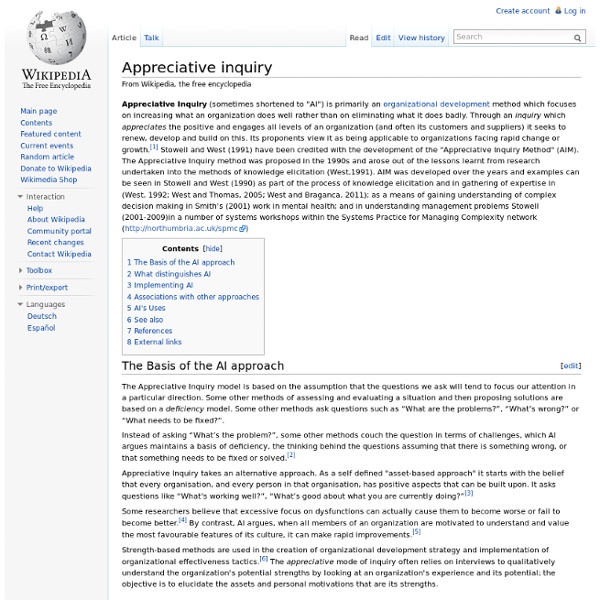Appreciative inquiry

Learning Organizations (Peter Senge)
A learning organization is the term given to a company that facilitates the learning of its members and continuously transforms itself.[1] Learning organizations develop as a result of the pressures facing modern organizations and enables them to remain competitive in the business environment.[2] A learning organization has five main features; systems thinking, personal mastery, mental models, shared vision and team learning.[3] The Learning organization concept was coined through the work and research of Peter Senge and his colleagues [4] . It encourages organizations to shift to a more interconnected way of thinking. Organizations should become more like communities that employees can feel a commitment to.[5] They will work harder for an organization they are committed to.[citation needed] Development[edit] Organizations do not organically develop into learning organizations; there are factors prompting their change. Characteristics[edit] Systems thinking. Personal mastery.
Sallie Lee & Shared Sun Studio
Summits Blog
Jason Mitchell is the head of the Social Cognitive and Affective Neuroscience Lab at Harvard University. He uses functional neuroimaging (fMRI) and behavioral methods to study how we infer the thoughts, feelings, and opinions of others (i.e., how we mentalize), as well as how we reason about counterfactual experiences. During Jason’s session on Day 1 of the 2010 Summit he explored the subject of “Making Sense of Others”. Psychologists have begun to realize that a large part of what allows us to be such a force on this planet comes not only from our cognitive abilities but also a set of specialized abilities that allow us to harness the energies of other people and hook up to their minds. Humans have the unique ability to cooperate in ways that contribute more effective communities, by plugging into the know-how and information that resides in the head of each individual. We are veracious mind readers and are constantly trying to make sense of others.
Gervase Bushe
Gervase Bushe (pronounced Jervis Bush) has 30 years of experience in a wide range of organizational change and development projects. Early in his career he focused on large companies making the transition from command and control bureaucracies to team based organizations. Later he worked primarily with technology-based, high growth companies helping them retain their team cultures while becoming more structured. Most recently he's been working in the most complex and difficult to change organizations of all: healthcare and public education. Gervase has worked with companies to redesign their structures, change their cultures, improve their customer satisfaction and increase their operational effectiveness. Gervase primarily consults to executives and internal change teams in two areas: 1) developing more effective executive teams and 2) designing transformational change processes. Gervase's skills in leadership development are widely sought. Dr.
About Jackie Kelm | Appreciative Living
You’re listening to Jackie Kelm’s Sirius Satellite XM radio interview on the “Fully Alive” Show with Dr. Greg & Lisa Popcak To contact Jackie for your next event, email her at admin@AppreciativeLiving.com or call (800) 214-0959 or (704) 799-0975. Education: MBA, Organization Behavior Concentration, Case Western Reserve UniversityBS Mechanical Engineering, Kettering Institute of Technology Related Experience: TRACOM Certified SOCIAL STYLE & Versatility InstructorAssociate Trainer, NTL University, Case-NTL Appreciative Inquiry Certification ProgramFounding Member, Appreciative Inquiry ConsultingCertified Laughter Leader, World Laughter Tour Previous Experience: Manager, Ernst & Young LLP, Leadership & Organization Change GroupOwner, Jacqueline’s Carpet Artistry, Custom Carpet Sculpting BusinessBearing Application Engineer, The Timken CompanyHVAC Development Engineer, General Motors Download bio here: J Kelm Bio (PDF doc) Download detailed resume here: Kelm Detailed Resume 2012 (PDF doc) Kelm, J.
Strength based organizations
La puissance des organisations qui se basent sur leurs forces
Related:
Related:



